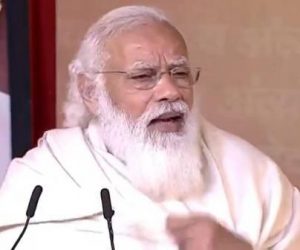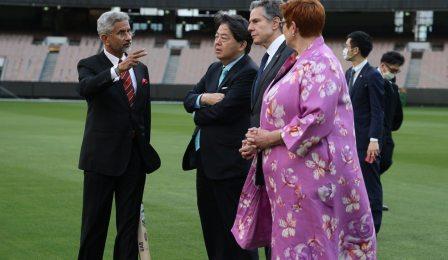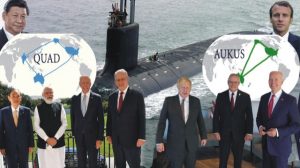

The meeting of the Quadrilateral Security has got an immense importance as the United States has affirmed that Senkaku Islands, disputed by China, fall under the purview of the Japan-US Treaty hence America would openly come into the support of Tokyo through military aid if China dares to attack it in future.
As per the White House announcement, Biden is scheduled to travel to South Korea, and Japan from May 20 to 24 for a five-day visit, and will also attend the summit of the Quad in Tokyo. Biden will also hold bilateral meetings with PM Modi, South Korean President Yoon Suk Yeol, and Japanese Prime Minister Fumio Kishida.
“This trip will advance the Biden-Harris administration’s rock-solid commitment to a free and open Indo-Pacific,” said the White House statement. In Tokyo, President Biden will also meet the leaders of the Quad grouping of Australia, Japan, India, and the US looks forward to having further details to share about this trip soon,” it said.
Indo-Pacific is Strategic
 Against the backdrop of Russia’s attack on Ukraine, Washington has sent a clear signal to China that it gives strategic importance to Indo-Pacific which is also on its agenda.
Against the backdrop of Russia’s attack on Ukraine, Washington has sent a clear signal to China that it gives strategic importance to Indo-Pacific which is also on its agenda.
China is on America’s radar, especially in view of the security of Taiwan which is bound to be protected by the US if Dragon thinks of misadventure to attack it.
India is also perturbed over the aggression of China over her borders which makes Quad relevant for her and creates a joint front to check Chinese expansionist policy.
An urgent virtual meeting of Quad organized by Biden on March 3 was attended by QUAD leaders including Australian Prime Minister Scott Morrison and Japanese Prime Minister Fumio Kishida.

PM Modi in that meeting had emphasized that the Quad must pay special attention to its core objective of promoting stability, peace, and prosperity in the Indo-Pacific region.
PM Modi sought concrete and practical forms of cooperation within the Quad in areas like supply chains, debt sustainability, humanitarian and Disaster Relief, clean energy, connectivity, capacity-building, etc.
While refereeing India’s stand on Ukraine, Modi had preferred the dialogue and diplomacy which will remain the same in the upcoming summit.
Dragon Alarmed
As usual, China strongly reacted to the upcoming Quad meeting saying that it smacks of “military confrontation.” During a daily news briefing, China’s Foreign Ministry spokesperson, Wang Wenbin said that countries should cooperate and promote regional peace rather than “forming exclusive cliques detrimental to mutual trust and cooperation among regional countries.” He termed the Quad grouping as “steeped in the obsolete Cold War and zero-sum mentality, and reeks of military confrontation” adding that “It runs counter to the trend of the times and is doomed to be rejected.”
United stand Against Russia?
Analysts feel that the US is likely to seek the support of Quad members to have a unified stand to punish Russia for its attack on a nation that is being destroyed and civilians have been targeted through bombings, etc. In a prelude to the Quad discussion in Tokyo, a meeting was held between the US Defense Secretary of State, Lloyd Austin and Japanese Defense Minister Nobuo Kishi who held a discussion to line up their security strategies and cement cooperation to deter any change of status quo in the Indo-Pacific by use of force, especially by China.
Quad and the New Frontier
The US has been a driving force behind Quad. As a part of its initiative, the foreign ministers of the Quad grouping of India, the US, Australia, and Japan had vowed in Feb 2022 to work vigorously to achieve the grouping’s shared vision of a free, open, and inclusive Indo-Pacific and collectively deal with common threats such as terrorism.
 When the Indian External Affairs Minister S Jaishankar, US Secretary of State Antony Blinken, Japanese Foreign Minister Yoshimasa Hayashi, and Australia’s Marise Payn held the talks in Melbourne, they had made it clear that the Quad was committed to supporting principles of openness, protection of national sovereignty and observance of rules and fair play, in remarks seen as a message to China.
When the Indian External Affairs Minister S Jaishankar, US Secretary of State Antony Blinken, Japanese Foreign Minister Yoshimasa Hayashi, and Australia’s Marise Payn held the talks in Melbourne, they had made it clear that the Quad was committed to supporting principles of openness, protection of national sovereignty and observance of rules and fair play, in remarks seen as a message to China.
Jaishankar had observed that the interactions were evidence of the robust bilateral relations between the Quad countries, their strategic convergence, and shared democratic values that make the Quad a vibrant and substantial framework.
The Pandemic Galore
The Quad vaccine partnership was announced in March last year with an aim to deliver one billion doses of vaccines to the Indo-Pacific region by the end of 2022. All members made relentless efforts to make it a success.
The production of Johnson and Johnson’s Janssen vaccines started at India’s Biological E facility in Hyderabad in October last year with the assistance of the US Development Financial Cooperation (DFC) through a credit line of USD 50 million to augment manufacturing capacity.
The Quad is also pursuing work on 5G technology, interoperable telecommunication ecosystem through collaboration and vendor diversification to maintain a diverse, open with like-minded partners. The quad may dwell upon these issues to take the initiatives forward.
Regional Security: A Prime Concern
The Quad is an informal strategic forum comprising four nations, namely – The US, India, Australia, and Japan. One of the primary objectives of the Quad is to work for a free, open, prosperous, and inclusive Indo-Pacific region. The group met for the first time in 2007 on the sidelines of the Association of Southeast Asian Nations (ASEAN). It is considered an alliance of maritime democracies, and the forum is maintained by meetings, semi-regular summits, information exchanges, and military drills of all the member countries.

America’s concern is related to the over-ambition of China to become a superpower. Hence, Quad and AUKUS have been created to checkmate Dragon. The UK, US, and Australia have announced a historic security pact in the Asia-Pacific, in what’s seen as an effort to counter China, and called the AUKUS pact and AUKUS alliance.
Under the AUKUS alliance, the three nations have agreed to enhance the development of joint capabilities and technology sharing, and foster deeper integration of security and defense-related science, technology, industrial bases, and supply chains.
Under the first major initiative of AUKUS, Australia would build a fleet of nuclear-powered submarines with the help of the US and the UK, a capability aimed at promoting stability in the Indo-Pacific region. America has made it clear that AUKUS does not undermine the importance of Quad as both will supplement each other’s efforts and initiatives in the future.
China has condemned the agreement as “extremely irresponsible. The Alliance undermines regional peace and stability and intensifies the arms race. It shall reinvent a Cold War mentality and ideological prejudice.”
In all, Quad creates a sense of security against the aggression of any country and joint efforts to deliver, which may not be possible in isolation, especially in the Indo-pacific which has got a lot of relevance to the US, India, Japan, and Australia. ![]()
Also Read:
Centre’s Opaque Auction Rules For Pulses Rip Off Govt Coffers, Help Millers Strike Rich
Need to amend laws like UAPA to provide for punishment for those who slap false cases
Global Arms Trade: Who are the real winners?
Why not 40 pc tickets for women in Punjab and elsewhere?
Punjab – How a deadly cocktail of Agri-Water-Energy nexus going to destroy it?

Disclaimer : PunjabTodayTV.com and other platforms of the Punjab Today group strive to include views and opinions from across the entire spectrum, but by no means do we agree with everything we publish. Our efforts and editorial choices consistently underscore our authors’ right to the freedom of speech. However, it should be clear to all readers that individual authors are responsible for the information, ideas or opinions in their articles, and very often, these do not reflect the views of PunjabTodayTV.com or other platforms of the group. Punjab Today does not assume any responsibility or liability for the views of authors whose work appears here.
Punjab Today believes in serious, engaging, narrative journalism at a time when mainstream media houses seem to have given up on long-form writing and news television has blurred or altogether erased the lines between news and slapstick entertainment. We at Punjab Today believe that readers such as yourself appreciate cerebral journalism, and would like you to hold us against the best international industry standards. Brickbats are welcome even more than bouquets, though an occasional pat on the back is always encouraging. Good journalism can be a lifeline in these uncertain times worldwide. You can support us in myriad ways. To begin with, by spreading word about us and forwarding this reportage. Stay engaged.
— Team PT


Copyright © Punjab Today TV : All right Reserve 2016 - 2024 |